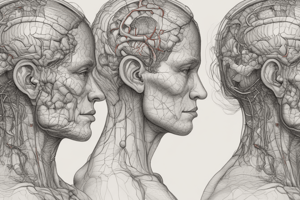Podcast
Questions and Answers
What are common symptoms of cerebral edema?
What are common symptoms of cerebral edema?
- Headaches, nausea, seizures, dizziness (correct)
- Chest pain, shortness of breath, coughing, sweating
- Fever, joint pain, muscle weakness, confusion
- Blurred vision, sore throat, abdominal pain, fatigue
Which brain injuries are commonly associated with cerebral edema?
Which brain injuries are commonly associated with cerebral edema?
- Concussion, whiplash, spinal cord injury
- Ischemic stroke, subarachnoid hemorrhage, traumatic brain injury (correct)
- Migraine, tension headache, cluster headache
- Bell's palsy, trigeminal neuralgia, multiple sclerosis
How is the diagnosis of cerebral edema confirmed?
How is the diagnosis of cerebral edema confirmed?
- By serial neuroimaging (computed tomography scans and magnetic resonance imaging) (correct)
- By blood tests for cholesterol and triglycerides
- By electrocardiogram (ECG) and echocardiogram (ECHO)
- By urine analysis for protein and glucose
What does the treatment of cerebral edema depend on?
What does the treatment of cerebral edema depend on?
What can cerebral edema eventually lead to?
What can cerebral edema eventually lead to?
Which condition is characterized by the build-up of fluid in the body's tissue?
Which condition is characterized by the build-up of fluid in the body's tissue?
What is a possible cause of edema?
What is a possible cause of edema?
In which group of patients may edema occur due to immobility?
In which group of patients may edema occur due to immobility?
What may be a part of the treatment for edema if sodium retention is involved?
What may be a part of the treatment for edema if sodium retention is involved?
When is edema more concerning?
When is edema more concerning?
Flashcards are hidden until you start studying




